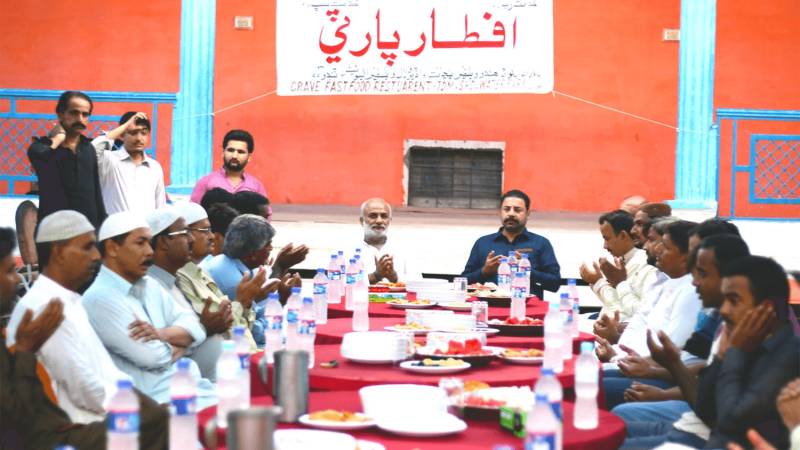
As Ramadan began in the southeastern district of Tharparkar, the Muslim residents of this region began to keep their fasts from just before sunrise to just after sunset. As has become tradition, some hosted iftar parties, inviting the fasting Muslims to break their fasts together.
But in the district of Tharparkar, where around 43% of the population is non-Muslim, a Hindu resident decided to host an iftar for his Muslim fellows. His act of interfaith harmony has quickly gone viral on social media.
A Hindu doctor, Dr Bharhat Kumar, who is the administrator at the National Institute of Cardiovascular Diseases (NICVD) Mithi, hosted an iftar for his Muslim fellows.
Pictures of Muslims breaking their fast and offering Maghrib prayers at the house of the Hindu doctor went viral. Netizens praised the remarkable example of interfaith harmony, which is said to be a centuries-old tradition in this part of Sindh.
While sharing his views with The Friday Times, Dr Kumar said that the districts of Tharparkar and Umerkot are known for fostering interfaith harmony, peace, and unity among their diverse resident communities.
He found the response a little surprising, given that he had hosted several Iftar parties for his Muslim friends and colleagues in the past, but this time, pictures of the Iftar party went viral.
Talking about the harmonious atmosphere of the desert region of Sindh, he said that the Muslims of Tharparkar enthusiastically participate in Hindu festivals, and the Hindus do the same for Muslim festivals.
He pointed out how they exchanged sweets and gifts at the Muslim festival of Eid and the Hindu festival of Diwali.
"A Muslim here is as happy on Diwali as a Hindu is on Eid," he said.
"People here have always discouraged all sorts of discrimination," he said, adding that the people of Tharparkar are simple, soft-spoken, humble, and shun fanaticism.
Local resident Advocate Mansoor Samejo corroborated Dr Kumar's views and said that amid increasing intolerance across the country, such initiatives signal hope.
He said that Sindh follows the teachings of its Sufis, who promoted peace and unity among its diverse residents. He added that similar harmony is observed amongst Hindus and Muslims residing in other districts of Sindh where the population ratio is closer to parity or favours the former over the latter, such as Umerkot, Mirpurkhas, and Sanghar.
Samejo hoped such bonds between the two communities would put Pakistan on the path of progress.

